In November of 1997, the Washington Capitals found themselves in uncharted territory as they would be in the news for the wrong reasons.
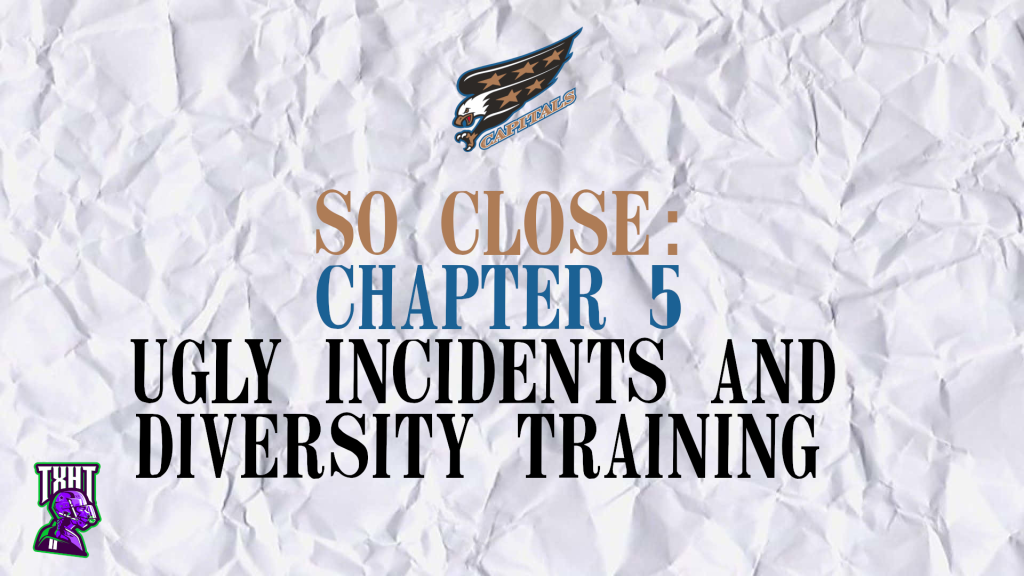
Chris Simon and Mike Grier
On November 8th,, the Washington Capitals’ victory over the Edmonton Oilers became overshadowed by an incident between Capitals forward Chris Simon and Oilers forward Mike Grier after the final buzzer. Simon is Native American and a member of the Ojibwa tribe, allegedly used racial slurs towards Grier, who is black. The incident earned Simon a gross misconduct from the officials.
According to the NHL Direct of Officiating Bryan Lewis, who was at the game, NHL Senior Vice President Brian Burke reviewed the incident. A final decision on consequences for Simon’s actions was expected before the Capitals went up against the Florida Panthers the following day.
“It was Simon who apparently made some racial slurs,” Lewis said. “The league said suspension [is likely] in the case of something like this. there was a directive issued. It contained a number of things in terms of incidents and player conduct.”
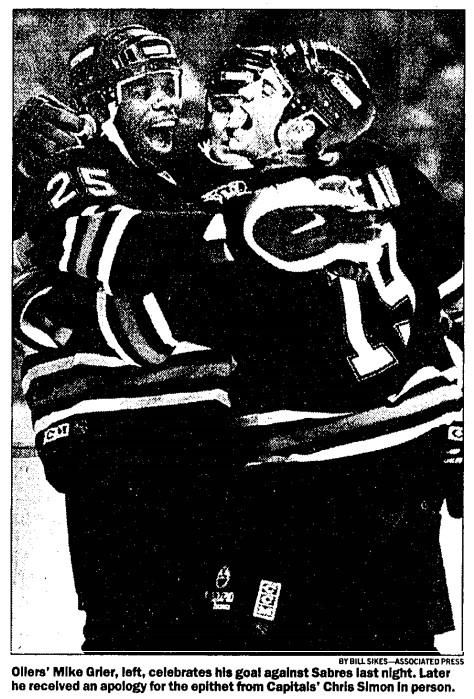
Both Grier and Simon, who wears his hair long and has a tattoo to honor his heritage, declined to comment on the incident after the game. “I definitely heard a racial slur from Mr. Simon, which I thought with his race and background that he wouldn’t do that,” Edmonton coach Ron Low said. “I would imagine that from the memo from the league [from before the season started], there would be a suspension. We were told that a month ago.” Low would continue, “He [linesman Gord Broseker] assured me coming off the ice that he heard it.”
While several Capitals players declined to comment, and coach Ron Wilson claimed he didn’t hear Simon’s comments, Oilers captain Kelly Buchberger was upset. “We’re of all different nationalities,” Buchberger said. “You just don’t fire words like that around. You’re showing no class.”
On November 9th, the NHL suspended Simon for directing a racial slur at Grier, and scheduled a hearing for Simon for the following day to determine further disciplinary action. According to a league press release issued before the Capitals game against the Florida Panthers, the suspension was the “result of a racial slur made by Mr. Simon” to Grier. Burke decided following telephone interviews with Simon and two on-ice officials who heard Simon’s remarks. Several league sources mentioned that the suspension extended beyond the game against the Panthers and that Simon’s case may be used to make an example to the rest of the league.
Simon, coach Ron Wilson, and general manager George McPhee were directed by the NHL to not comment on the incident, but Grier would speak to the media from Buffalo as the Oilers prepared for their game against the Sabres. “Racism, in general, is in our society, and I’m not the only person who has to deal with it,” Grier said. “I’ve grown up playing the sport. I know what goes on. But it does raise my awareness more. Maybe it’s something I’ve got to stand on my toes about for as long as I play in this league. Maybe it’s more of an issue than I thought.”
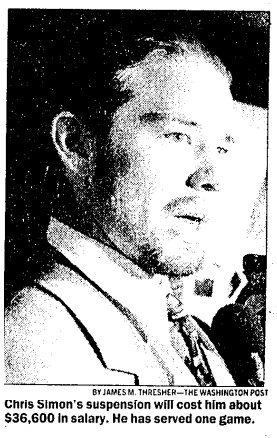
“Last year I didn’t have any problems,” Grier, who is one of a small number of black players in the NHL, continued. “Everyone in the league was straight up and honest, but it’s always in the back of your mind that something could happen in the heat of the moment.” Grier did not say what Simon said to him, but was surprised to hear a slur from Simon. “That’s what was strange to me, that it was someone who has his background and his race,” Grier said. “I didn’t expect it to come from another minority. It’s just a little more shocking.”
Florida Panther goalie Kevin Weekes, who is black, was also surprised by the incident. “I find it very ironic and very troubling, actually,” Weekes said. “When you have an incident like this, it tarnishes what the league is trying to accomplish. They need to set a precedent and send a message.”
Simon had accompanied the Capitals to Miami and said that he was the victim of racial slurs throughout his junior career and has spoken about how difficult those experiences were for him.
On November 10th, Chris Simon flew to Toronto and apologized to Mike Grier personally following the Oiler’s arrival to Toronto amid a six-game road trip. “He said ‘I’m sorry’ several times, and I believed him,” Grier told Edmonton reporters. “He had a very sincere look in his eye and his manner about him seemed honest. It takes a stand-up person to come out here and deal with the situation as quickly as he did. I accept his apology.”
“There is nothing I’m looking for or not looking for to come out of his hearing,” Grier continued. “I think he’s pretty broken up about it.”
Capitals owner Abe Pollin, who is Jewish, told the Washington Post’s Tony Kornheiser that he could empathize with Grier. “I know what it feels like,” Pollin said. “I’m a minority. I’ve been subjected to antisemitism.”
“The [epithet] is unacceptable, and it won’t be tolerated by me,” Pollin said. “I am prepared to have [Simon] apologize to the appropriate people. . . . It might also be appropriate for him to do some community service.”
“Chris Simon made a mistake and he knows it,” general manager George McPhee said. “He’s embarrassed, he’s ashamed and he’s contrite. He’s going to apologize to Mike Grier, and then he’s going to New York on Tuesday for a league hearing and he’s going to look everybody in the eye, admit what he did, and apologize.”
Pollin was upset by what he’d heard about the incident, especially since he liked Simon. “I’ve had him to my house,” Pollin said. “He’s a fine young man. . . . I guess he just lost his cool.”
“It’s unacceptable, but I’m not prepared to crucify the young man,” Pollin said, trying to rally to Simon’s side without rallying to his defense. “We all make mistakes. I’m prepared to forgive him.”
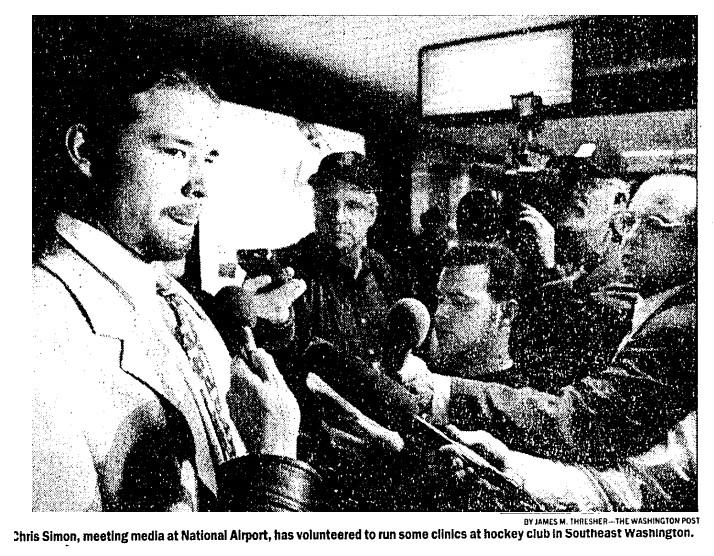
On November 11th, the NHL suspended Simon for three games without pay in response to the incident. At that point, Simon had already missed one game and was set to miss two more, one against the Pittsburgh Penguins and another against the Sabres. The suspension cost Simon $36,600 in salary, and he also volunteered to run some clinics at the Fort Dupont Ice Hockey Club in Southeast Washington.
“First of all, I want everyone to know that I got to meet with Mike Grier and I apologized to him face to face,” Simon said. “I’m very saddened and embarrassed by what took place. It’s unacceptable. There’s no excuse for it. Before I saw Mike this was very hard for me. The last two nights before that I didn’t sleep. But the most important thing for me was to apologize to him, the Washington Capitals organization, and the people of Washington.”
“At the end of the game we came on the ice,” Simon continued. “The two of us had words to say to each other. At the end, that came out. It shouldn’t have happened.”
Simon’s only other suspension was in 1995 when he batted a stick toward then-Philadelphia Flyers defenseman Dennis Vial after Vial called him a racial slur. After that incident, and another in the American Hockey League, the NHL released a policy on racial epithets, condemning racism and also condemning physical retaliation for their use. Simon was aware that the same policy he was responsible for creating led to consequences for him.
“It’s been done to me growing up, and I should have known better,” Simon said. “Hopefully I’ll be forgiven.”
Meanwhile, Grier proclaimed that the three-game suspension was appropriate. “[Simon has] been through a lot [since the incident],” Grier said. “I’m sure I can forgive him, I’m not sure I’m going to be able to forget for a long time. It’s something we’re both going to have to live with.”
“I’m quite proud of both individuals involved,” Capital general manager George McPhee said. “Mike Grier was very gracious; he kept a clear mind and opened his heart and accepted Chris’s apology. And Chris showed some courage and humility. He was very nervous before the meeting [Nov. 10th]; he had a lot of anxiety.”
“[Simon’s] volunteered to work with some inner-city kids, similar to what he’s done on his reservation with native kids,” McPhee said. “We do believe that his reaction to his mistake mitigated the suspension. We all make mistakes, it’s how we respond to mistakes that’s just as normal.”
Before Simon’s suspension, NHL Senior Vice President Brian Burke had never suspended a player for a racial epithet. “While Mr. Simon’s initiative in traveling to Toronto to apologize to Mr. Grier is commendable, his action warrants the discipline imposed,” Burke said. “We want a clear message sent to our players and our fans that this conduct is unacceptable.”
Burke also noted that he was impressed with Simon’s desire to do community service.
On November 15th, Simon returned to the Capitals lineup, and in the week following he would go on a four-game point-scoring streak. “A guy like Chris Simon has been unbelievable since coming back from that suspension,” Capitals coach Ron Wilson said. “He’s playing with two great hockey players [Peter Bondra and Adam Oates] and he is understanding his role on that line.”
Simon would later say that he was glad he wasn’t playing after the racial slur incident took place, and that he needed to think about what he had done, and since returning, Simon kept his mind calm, and his stick busy.
Craig Berube and Peter Worrell
On November 23rd, 1997, in a game against the Florida Panthers, Washington Capitals forward Craig Berube and Panthers forward Peter Worrell scuffled during the third period where words were exchanged. However, Worrell, who is black, did not say if Berube’s, who is Native American, comments were racial in nature. Worrell also opted not to speak with Berube after the game when the latter attempted to engage him.
The following day, the NHL announced a telephone hearing on November 25th between NHL Senior Vice President Brian Burke and Craig Berube to determine whether his alleged comment towards Panthers forward Peter Worrell was racially offensive. During a third period scuffle Berube,a member of the First Nations (part Cree) allegedly called Worrell a “monkey” when they were exchanging insults.
According to sources familiar with the situation, per Rachel Alexander’s reporting, Berube felt the comment had no racist intent, and apparently, he has used the same term when speaking to players who are not black, per those same sources.
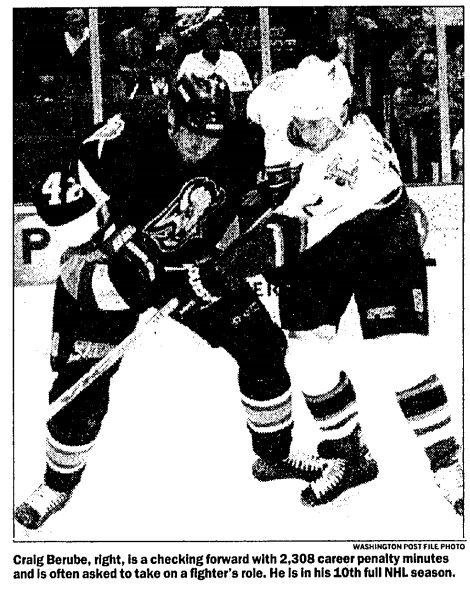
After the Panthers practice on the 24th, Worrell said that “things were said, things I didn’t like, but it’s part of the nature of the beast. It’s best to move on. I’m not a person that likes to air my dirty laundry in the public. It’s nothing I haven’t been able to handle before in the past.”
After the Panthers vs Capitals game, referee Paul Devorski filed a report with Bryan Lewis, the NHL’s director of officiating. Burke spoke with Berube about the incident, but had not yet spoken to Worrell. “The matter is under review by the league, but we don’t want to comment on it until they’ve spoken to everybody,” Capitals general manager George McPhee said. “Needless to say, we’re concerned.”
On November 25th, the NHL suspended Berube for one game without pay for an “offensive comment” he made towards Worrell. Berube lost $2,857 in salary as a result of the suspension. During the phone hearing, Berube went on to tell Burke that the comment had no racial intent, and that it was a word that he directed at non-black players in the past. Berube also informed Burke that he apologized to Worrell in a separate phone call.
However, Burke still felt the comment required disciplinary action. “Even accepting Mr. Berube’s explanation of what transpired and that Mr. Worrell is satisfied with the explanation and Mr. Berube’s apology, the remarks cannot be ignored,” Burke said via news release. Burke also noted that the Berube and Chris Simon incidents were not comparable because Berube’s comments lacked racial intent.
“I don’t think I could have been more disappointed than I was when I heard [about Berube]. My heart sank momentarily,” McPhee said in a conference call. “I guess you just can’t take anything for granted these days. I thought we had been through enough once and to have a similar incident repeated was certainly disturbing.”
McPhee also noted several times that Berube “in no way thought this particular word would have a racist connotation. This is more of an educational issue than anything else. The player didn’t think this remark would carry that connotation, and is that fair? I’m not sure.” McPhee suggested leaguewide sensitivity training, saying that “if this particular player did not realize that this was wrong, maybe there are others that need the same education.”
“I’m not going to issue a list of words you can’t say,” Burke said. “Like one of the Supreme Court Justices once said about obscenity, I’m not going to give you a list of what’s obscene, but I know it when I see it. We’re just going to deal with this on a case-by-case basis, and frankly, hopefully, we won’t have any more of these to deal with.”
“I just want to emphasize that I’ve said this to different hockey players in the league over the years,” Berube said. “Big, tall guys are called that, and it isn’t racial in any way. I’m sorry if Peter Worrell took it that way or if anyone else took it that way. I really stress that part of it, because it came out in some places that Craig Berube was suspended for a racial slur, and it wasn’t that, it was an offensive remark. That’s important to me and my family.”
At the Panthers practice, Worrell, a 20-year-old rookie who played in his second NHL game on November 23rd, addressed the media saying: “I basically want this whole thing to go away. I don’t think it was meant in the context it was said. I’d just as soon not make it any bigger than it was. This was unfortunate, but I’ve been waiting a long time to get to the NHL, and this isn’t going to spoil it.”
However, Berube’s suspension did not sit well with several of his Capitals teammates. “What was said to Mike Grier, I do not condone at all, and it was a real problem,” goalie Bill Ranford said. “But every big, tall guy in this league has been called a monkey. This is way out of control.”
“Once we all start complaining about what is said, we’d have to shut down the league,” defenseman Sylvain Cote, who’s been called names based upon his French Canadian heritage, said. “There are some things said that are not so nice about my mother. Is that legal?”
Diversity Training
After seeing two players suspended for a total of 4 games in a two week span due to racially offensive remarks, Washington Capitals general manager George McPhee announced that the team would undergo sensitivity training. This was very significant as both Chris Simon and Craig Berube became the first two players to be suspended by the NHL for racial remarks, and especially of note due to the NHL’s involvement with the upcoming 1998 Winter Olympic Games for the first time in league history.
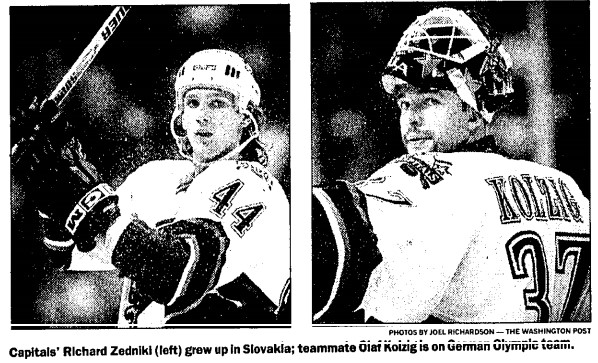
In December of 1997, the National Hockey League (NHL) had the Capitals undergo another diversity training session. That session was led by a member of Washington Sports and Entertainment’s human resources department and specifically on sensitivity to minorities. While the suspensions were a first for the NHL, the league has been struggling with what had been an all-white, dominantly Canadian into a diverse sport since the 1970s.
Coach Ron Wilson introduced a looser version of the diversity training, one that felt like you were in a third-grade geography class. “I want to have a day here and there where a guy will stand up and the rest of the guys have to learn five words of their language — even if it’s five bad words, whatever,” Wilson said. “We have to do things like that. Otherwise we’re just trying to force things on people here. We are not the only country in the world.”
Of the 24 players on the Capitals roster, eleven grew up speaking a language other than English, making them the most ethnically diverse team in the NHL. With that fact, it sparked Wilson’s interest in activities like borsch tasting.
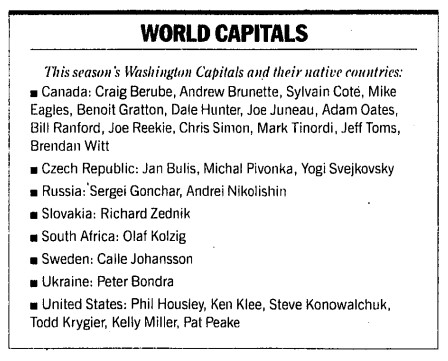
“It just used to be that there was the attitude toward Europeans that it’s our game: How dare you come over here and play it?” said former New York Rangers goaltender and Fox Sports commentator John Davidson. “They really paid for that physically. It was automatically ingrained in a person’s mind that the Europeans could be intimidated.”
For Capitals forward Michal Pivonka, a native of Kladno, Czechia, he and his wife Renata had to sneak out of what was then Czechoslovakia in the middle of the night in July of 1986. Pivonka spoke very little English when they arrived. “It wasn’t as bad for me as the Swedish guys who came over in the 70s, but I was the only European player on the Capitals that year,” Pivonka said. “You had to try to learn the language quickly, because it could be very frustrating. If you needed something, there was no one you could talk to. The only person around me who knew Czech was my wife, and she didn’t know anything about hockey or what was going on at the rink.”
While accepted by his teammates, there was plenty of rough play and name-calling from opponents. “You did hear things — certainly no one got suspended for them,” Pivonka said. “And [to North Americans] all Europeans were Russians. It didn’t matter if you were actually Czech or German or what; to them we were all one way and one thing and that comes with that.”
“In some ways, stereotypes about a culture are easier for some people to rationalize than racial stereotypes,” Wilson said. “When you paint with a very wide brush, you can say there is a difference in the way you are brought up to play, and those differences are evident on the ice. But the real stereotypes just come out of ignorance. They were easy to maintain because it was accepted, but they did begin to change.”
Europeans weren’t the only group given a hard time. French Canadians dealt with language barriers. Black and Native Americans dealt with racial differences, and Jewish players were confronted with antisemitism and religious challenges.
“I started learning English when I was 18 and went to Hartford,” Capitals defenseman Sylvain Cote, a Quebec City native, said. “My biggest problem at the beginning was telling the difference between a quarter to and a garter after. I was late for a lot of meetings. I heard it [ethnic taunting] so many times, sometimes even from my teammates, but I figured I’d just deal with it. A lot of guys that were that way, that had prejudice against people, they had short careers anyway. If they had a hearing every time someone called me a ‘frog,’ I’d spent my whole career at the league office.”
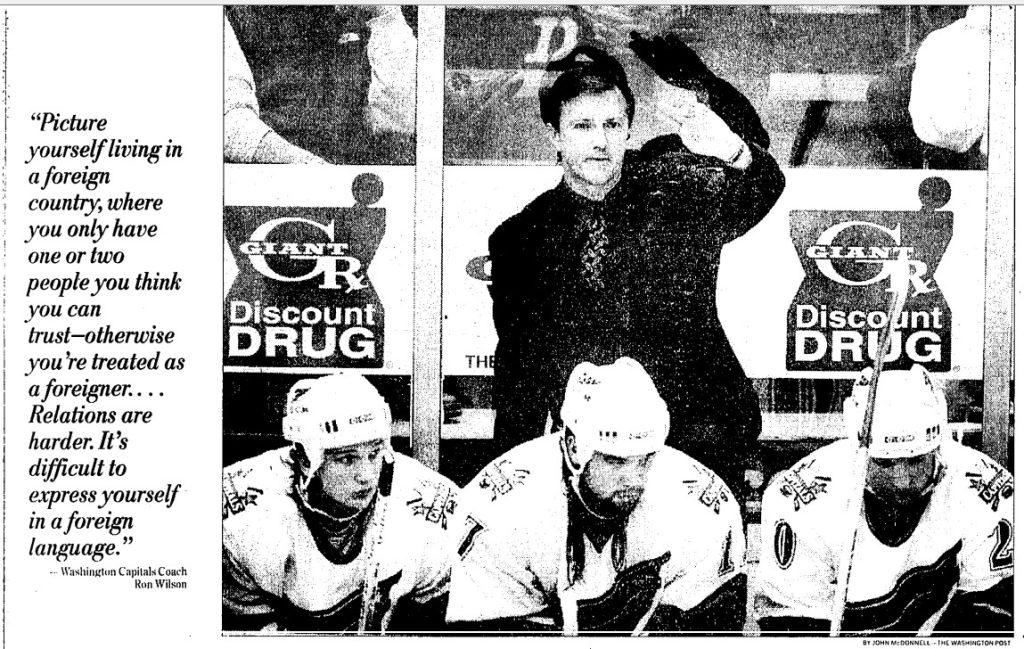
“Picture yourself living in a foreign country, where you only have one or two people you think you can trust — otherwise you’re treated as a foreigner,” said Wilson, who played in Switzerland in the 1980s. “In Switzerland, each team is allowed to have two ‘auslaenders.’ That literally means ‘outsider.’ Relations are harder. It’s difficult to express yourself in a foreign language. I see that here with younger guys like Sergei Gonchar. If he doesn’t play, is he thinking in his mind; ‘I’m not playing because I’m Russian’? That’s the easiest excuse in the world, and as a player you have to guard against that, but as someone who’s been there you can also empathize with their feelings.”
Because of his experiences in Switzerland, Wilson allowed the Capitals’ European players to speak whatever language they wanted on the team bus and in the locker room. Such conversations were prohibited on other teams during that time out of fear that players would feel left out, or that the non-English speakers were secretly making fun of them.
“When you live in a place where everyone else speaks a different language, it’s not fair for someone to say you can’t speak their own when you get the opportunity,” Capital general manager George McPhee said. “But there’s a difference now, too. When I was playing for the [New York] Rangers, our team had more Europeans than almost anyone. They didn’t speak much English, and it made for a quiet locker room sometimes. That wasn’t a good thing.”
“You have cliques on every team,” Capitals goaltender Olaf Kolzig, a native of Johannesburg, South Africa, raised in Canada but holding German citizenship said. “But last year a few of the boys went to a Russian restaurant with Sergei, and that’s something we’re going to try to do more and more this year. We have great chemistry on this team, but when it comes to different groups like that, there are still things you can do to make it stronger.”
With these incidents behind them, the Capitals look to ending their tenure at US Airways Arena, and moving into their new home, the MCI Center. Stay tuned for Chapter 6 – A New Home.

TXHT may earn an Affiliate Commission if you purchase something through Cool Hockey and Dr. Squatch ads/links in this article.
RESOURCES
- Alexander, Rachel. “Alleged Slur Mars Caps’ Win,” November 9, 1997. https://www.washingtonpost.com/archive/sports/1997/11/09/alleged-slur-mars-caps-win/ebbf5841-467f-425f-97b3-cab0b08ec1c9/.
- Alexander, Rachel. “Capitals’ Simon Suspended By the NHL for Racial Slur,” November 10, 1997. https://montgomery.idm.oclc.org/login?url=https://www.proquest.com/hnpwashingtonpost/historical-newspapers/capitals-simon-suspended-nhl-racial-slur/docview/1458332586/sem-2?accountid=47412.
- Kornheiser, Tony. “No Excuse, Just Contrition,” November 11, 1997. https://montgomery.idm.oclc.org/login?url=https://www.proquest.com/hnpwashingtonpost/historical-newspapers/no-excuse-just-contrition/docview/1458332547/sem-2?accountid=47412.
- Alexander, Rachel. “Simon Apologizes for Epithet,” November 11, 1997. https://www.washingtonpost.com/archive/sports/1997/11/11/simon-apologizes-for-epithet/fd4ae357-22b6-438b-8748-c6ec28713e65/.
- Alexander, Rachel, and Thomas Heath. “NHL Suspends Simon 3 Games Without Pay,” November 12, 1997. https://www.washingtonpost.com/archive/sports/1997/11/12/nhl-suspends-simon-3-games-without-pay/6e1f78b2-42e8-4037-a072-367d7c66ac1b/.
- Alexander, Rachel. “Capitals Top Panthers, 5-2, Win Fourth Consecutive Road Game,” November 24, 1997. https://montgomery.idm.oclc.org/login?url=https://www.proquest.com/hnpwashingtonpost/historical-newspapers/capitals-top-panthers-5-2-win-fourth-consecutive/docview/1458334402/sem-2?accountid=47412.
- Alexander, Rachel. “NHL Hearing Will Determine Nature of Berube’s Comment,” November 25, 1997. https://www.washingtonpost.com/archive/sports/1997/11/25/nhl-hearing-will-determine-nature-of-berubes-comment/c1a0603b-76e3-4ae2-9c8d-be8e7eda8526/.
- Alexander, Rachel. “Berube to Miss 1 Game,” November 26, 1997. https://www.washingtonpost.com/archive/sports/1997/11/26/berube-to-miss-1-game/2399fc88-adfd-420d-a2bd-ae4d3b58d1a1/.
- Alexander, Rachel. “Berube Suspension Has Some Capitals’ Teammates Curious,” November 27, 1997. https://www.washingtonpost.com/archive/sports/1997/11/27/berube-suspension-has-some-capitals-teammates-curious/fdb66618-8173-43b1-8849-4a92467a3772/.
- Alexander, Rachel. “Capitals Confront a Different World,” December 31, 1997. https://www.washingtonpost.com/archive/politics/1997/12/31/capitals-confront-a-different-world/0d206b5b-1a71-4c76-8ad8-553a46a68d2e/.
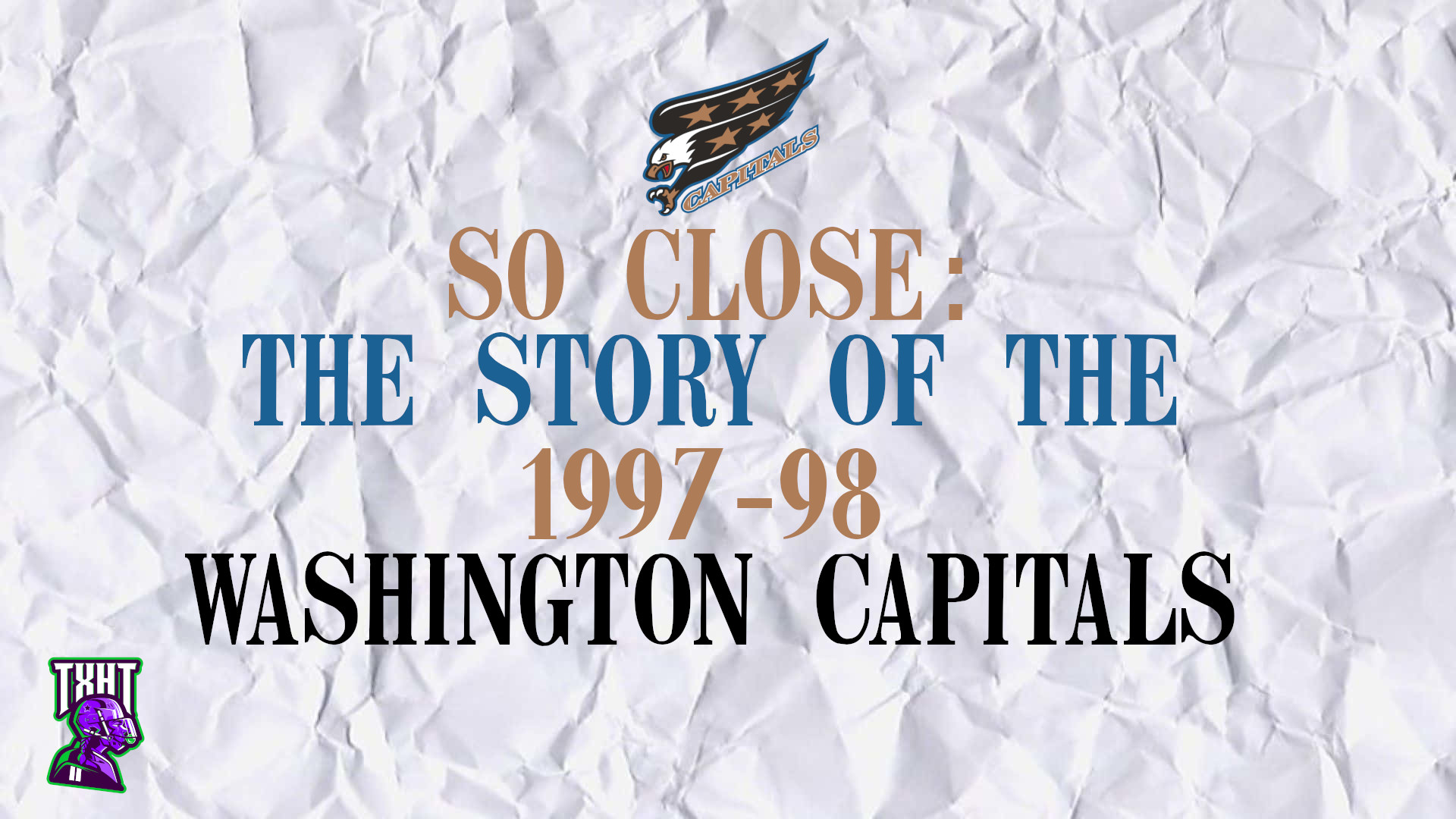
Leave a Reply